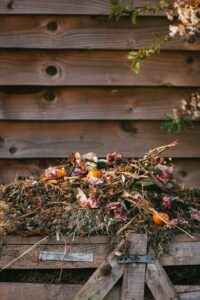
Composting is a very environmentally friendly thing to do and can help you grow a better garden. Throwing food waste and other organic matter into a compost pile rather than the trash reduces the amount of waste that we send to the landfill, and the final product makes a great soil amendment for your garden or house plants. Starting to compost may seem daunting, but it is simple and can be done by anyone, anywhere.
If you have outdoor space to compost, choose a site that has partial shade and is easy to access. You don’t necessarily need a structure, a pile would do just fine, but a structure made of chicken wire or old wood pallets will keep out animals and hide the pile from sight. If you don’t have an outdoor space, you can compost in a plastic bin indoors. Consider getting some composting worms (red wigglers work great) and building a simple worm bin for indoor composting. There are countless worm bin tutorials online and many are free or minimal cost designs.
The essential ingredients you need to start composting are organic matter (e.g. food waste, dried leaves, cardboard, etc.), water, air, and microorganisms (bacteria). Recent studies have shown that compost starters are not necessary, the organic matter that you add already has the bacteria needed to decompose your compost. Moisten materials as you place them in your compost, you want it to be moist but not waterlogged. To promote oxygen movement, don’t chop up the ingredients, leave some in larger chunks so there are spaces for oxygen.
Ideally a compost pile should heat up to about 125° F in the center to speed up bacterial decomposition and kill weed seeds or diseases. You can turn your pile to make sure all materials get heated. Turning will speed up the composting process but it is not necessary. It is best to not turn your outdoor pile after December until the spring to keep the heat in. Realistically, it is difficult in Colorado to get a pile up to 125° F, which is the temperature needed to kill weed seeds and diseases. For this reason, it is recommended that you do not compost diseased plants or weeds that have gone to seed. These materials can spread problems to your garden when you add the compost to your soil.
Compost is ready to use in your garden when it has shrunk to half it’s original size and none of the original materials are recognizable. Compost should never smell bad; it should have a neutral earthy smell. Cultivate a couple inches of finished compost into your vegetable garden every year. You can also leave the compost on the surface of the soil and use it as a mulch. Keep in mind, compost is a soil amendment, not a fertilizer. There are small amounts of nutrients in compost, but low fertility soil will still need to have fertilizer added.


